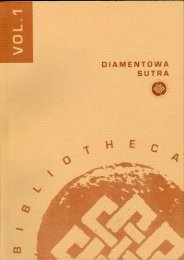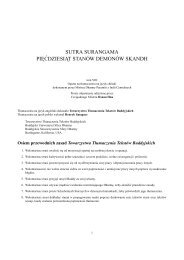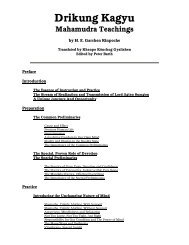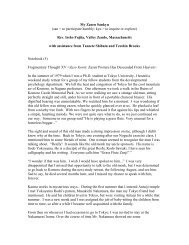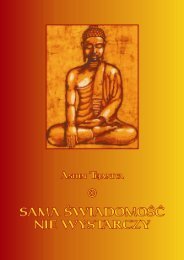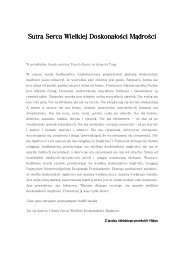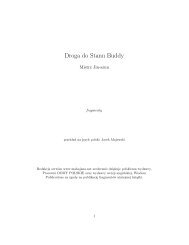3 - Computing in the Humanities and Social Sciences
3 - Computing in the Humanities and Social Sciences
3 - Computing in the Humanities and Social Sciences
Create successful ePaper yourself
Turn your PDF publications into a flip-book with our unique Google optimized e-Paper software.
itself between sh<strong>in</strong>gon <strong>and</strong> <strong>the</strong>ir effects (or <strong>the</strong>ir symbolic efficacy) is of an<br />
analogic <strong>and</strong> motivated character, as we will discuss <strong>in</strong> subsequent lectures.<br />
(ii) In <strong>the</strong> esoteric system, <strong>the</strong> persons <strong>in</strong>volved are obviously <strong>the</strong> ascetics,<br />
practitioners, <strong>and</strong> <strong>the</strong> performers of <strong>the</strong> ritual (<strong>in</strong>clud<strong>in</strong>g meditation) <strong>in</strong> general;<br />
<strong>the</strong> circumstances are primarily meditative <strong>and</strong> ritual. Many exegetes, however,<br />
extended <strong>the</strong>se categories to commoners (people not formally <strong>in</strong>itiated) <strong>and</strong> to<br />
everyday situations (outside of a strictly def<strong>in</strong>ed ritual context). In this way, all<br />
possible contexts <strong>and</strong> all be<strong>in</strong>gs (not just humans) turn to sacred entities as part of<br />
<strong>the</strong> esoteric universe.<br />
(iii <strong>and</strong> iv) The Sh<strong>in</strong>gon teach<strong>in</strong>gs presuppose <strong>the</strong> correct <strong>and</strong> <strong>in</strong>tegral performance<br />
of <strong>the</strong> procedure <strong>in</strong> <strong>the</strong> scrupulous respect of all its rules as <strong>the</strong> essential<br />
condition for trigger<strong>in</strong>g <strong>the</strong> power of mantras; as we have seen, <strong>the</strong> rules of <strong>the</strong><br />
performance control a number of parameters. However, simplified uses of<br />
mantras were gradually recognized <strong>and</strong> encouraged: <strong>the</strong>y were based on simple<br />
formulas (such as <strong>the</strong> two syllables a <strong>and</strong> un, associated with <strong>the</strong> two phases of<br />
breath<strong>in</strong>g), <strong>and</strong> <strong>the</strong> procedures were easy <strong>and</strong> short.<br />
(v <strong>and</strong> vi) The Buddhist tradition describes m<strong>in</strong>utely <strong>the</strong> psycho-physical state that<br />
<strong>the</strong> practitioner must assume <strong>in</strong> order to participate <strong>in</strong> a ritual or a religious<br />
practice. Ignor<strong>in</strong>g <strong>the</strong>se norms makes practice useless or, <strong>in</strong> certa<strong>in</strong> cases, even<br />
dangerous. In <strong>the</strong> middle ages, religious doubt <strong>and</strong> disbelief become serious s<strong>in</strong>s<br />
that <strong>in</strong> some cases could result <strong>in</strong> rebirth <strong>in</strong>to <strong>the</strong> Un<strong>in</strong>terrupted Hell. Consider<br />
for example this passage from a text by Kakuban:<br />
In <strong>the</strong> case of people of no wisdom who engage <strong>the</strong>mselves <strong>in</strong> practices<br />
<strong>and</strong> devotions <strong>in</strong> a superficial way, if <strong>the</strong>y have faith <strong>the</strong> merit <strong>the</strong>y<br />
acquire are far superior than <strong>the</strong> merit acquired even by practitioners of<br />
<strong>the</strong> esoteric teach<strong>in</strong>gs over <strong>in</strong>f<strong>in</strong>ite kalpas. If a Sh<strong>in</strong>gon practitioner arises<br />
a religious doubt even only once <strong>in</strong> a lifetime, that is a crime that<br />
determ<strong>in</strong>es fall <strong>in</strong>to <strong>the</strong> un<strong>in</strong>terrupted Hell as karmic retribution (Gor<strong>in</strong><br />
kujimyø himitsu shaku, <strong>in</strong> Miyasaka, ed., 1989: 210).<br />
3.2. Talismanic Usages of Mantric Expressions:<br />
The Illocutive L<strong>in</strong>guistic Space<br />
42



![Shushogi, Dogen Zenji [PDF] - Mahajana.net](https://img.yumpu.com/50921105/1/190x219/shushogi-dogen-zenji-pdf-mahajananet.jpg?quality=85)

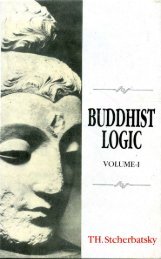
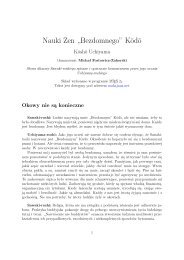
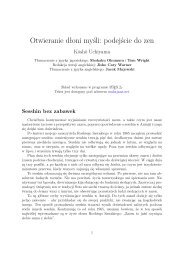
![wywiadu z Murakami Kosho Roshim [PDF] - Buddyzm w Polsce i na ...](https://img.yumpu.com/45809746/1/184x260/wywiadu-z-murakami-kosho-roshim-pdf-buddyzm-w-polsce-i-na-.jpg?quality=85)
